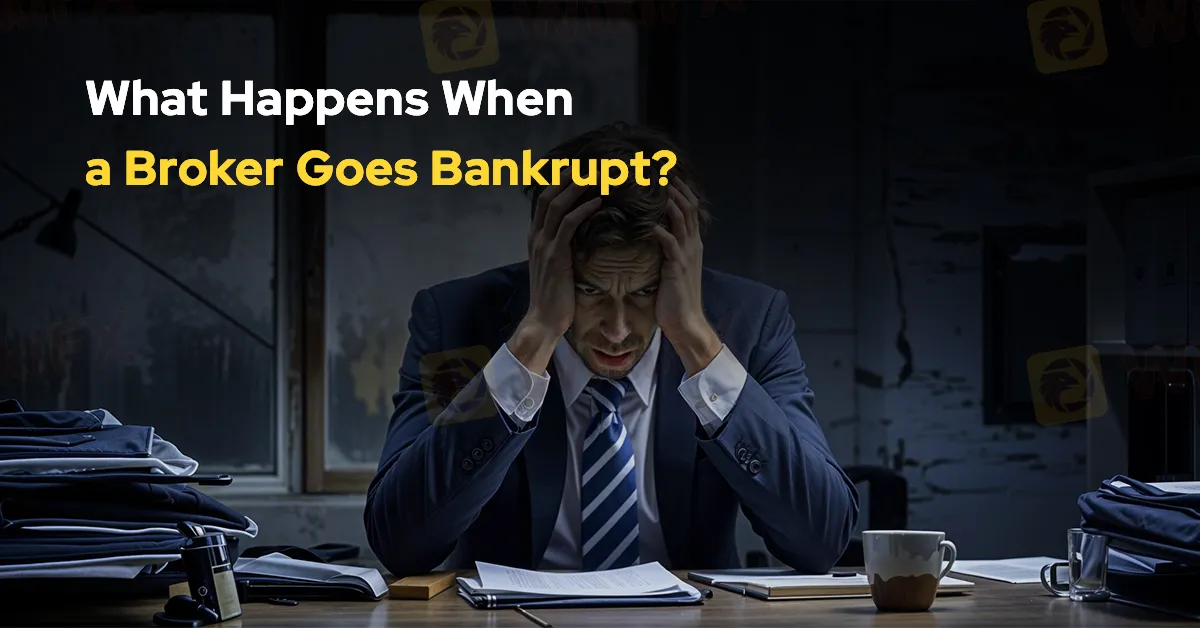简体中文
繁體中文
English
Pусский
日本語
ภาษาไทย
Tiếng Việt
Bahasa Indonesia
Español
हिन्दी
Filippiiniläinen
Français
Deutsch
Português
Türkçe
한국어
العربية
What Happens When a Broker Goes Bankrupt?
Abstract:Many trust brokers to hold their funds securely and facilitate their trades. However, when a broker collapses, the situation can become uncertain. Knowing what happens in such cases can help traders prepare and reduce potential losses.

The thought of a broker going bankrupt can be terrifying for traders. Many trust brokers to hold their funds securely and facilitate their trades. However, when a broker collapses, the situation can become uncertain. Knowing what happens in such cases can help traders prepare and reduce potential losses.
When a broker declares bankruptcy, the first concern is client funds. In many countries, brokers must keep client funds in segregated accounts. These accounts are separate from the broker‘s operational funds. This requirement ensures that client money is protected if the broker’s finances fail. However, not all brokers follow this rule, especially those operating in poorly regulated regions.
Regulators play a key role in managing broker insolvencies. In well-regulated markets, authorities step in to oversee the process. For example, in the UK, the Financial Conduct Authority (FCA) ensures that client funds are returned as a priority. Compensation schemes like the Financial Services Compensation Scheme (FSCS) also exist to protect clients. Under the FSCS, traders may receive compensation up to a certain limit if their broker fails.
In poorly regulated markets, the situation is more complex. Traders may struggle to recover funds. Brokers in these regions often lack safeguards like segregated accounts or compensation schemes. Without proper regulation, clients are left exposed to greater risks.

Another factor is whether the broker offers negative balance protection. If a trader‘s account balance goes negative during a broker’s financial trouble, it can complicate the claims process. Brokers offering this protection absorb client losses, but those that do not may hold traders responsible for debts.
The bankruptcy process can be lengthy. Administrators are appointed to assess the broker‘s finances and liabilities. They prioritise claims based on local laws and regulations. Traders must file claims to recover their funds. Depending on the broker’s financial health, recovery can take months or even years.
Fraudulent brokers present additional challenges. Some brokers declare bankruptcy to avoid paying clients. These cases often involve legal battles. Authorities must determine whether the broker acted in bad faith. Clients of fraudulent brokers may face greater difficulty in recovering their money.
To reduce risks, traders should choose brokers with strong regulatory oversight. Brokers regulated by authorities like the FCA or the Australian Securities and Investments Commission (ASIC) provide greater security. Always check if a broker holds client funds in segregated accounts. Researching a brokers financial stability is also important.
Broker bankruptcy is rare, but it is not impossible. Traders must remain vigilant and informed to safeguard their investments. Download the free WikiFX mobile application to conduct due diligence effortlessly.

Disclaimer:
The views in this article only represent the author's personal views, and do not constitute investment advice on this platform. This platform does not guarantee the accuracy, completeness and timeliness of the information in the article, and will not be liable for any loss caused by the use of or reliance on the information in the article.
Read more

What Impact on Investors as Oil Prices Decline?
Oil prices have come under pressure amid mounting concerns over U.S. import tariffs and rising output from OPEC+ producers. With tariffs on key trading partners and supply increases dampening fuel demand expectations, investor appetite for riskier assets has cooled. This shift in sentiment poses a range of implications for different segments of the investment landscape.

Teacher Lost Life Savings in WhatsApp Investment Fraud
A Malaysian teacher recently became the victim of an elaborate investment scam, losing more than RM200,000 after being lured into a fraudulent Bitcoin scheme through WhatsApp.

Unmasking a RM24 Million Forex Scam in Malaysia
Authorities in Malaysia have identified the prime suspect behind a foreign exchange (forex) investment fraud that has caused losses exceeding RM24 million.

How to Choose the Best Forex Pairs? Avoid Common Trading Pitfalls
Choosing the right forex pair is crucial for success. This guide explores volatility, trading sessions, and costs to help traders make informed decisions and maximize profitability.
WikiFX Broker
Latest News
Forex Trading: Scam or Real Opportunity?
The Hidden Tactics Brokers Use to Block Your Withdrawals
Beware: Online Share Buying Scam Costs 2,791,780 PHP in Losses
5 things I wish someone could have told me before I chose a forex broker
Unmasking a RM24 Million Forex Scam in Malaysia
U.S., Germany, and Finland Shut Down Garantex Over Money Laundering Allegations
Gold Prices Fluctuate: What Really Determines Their Value?
Dollar Under Fire—Is More Decline Ahead?
What Impact on Investors as Oil Prices Decline?
Is the North Korea's Lazarus Group the Biggest Crypto Hackers or Scapegoats?
Currency Calculator






